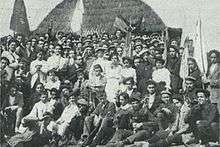Requetés
| Requetés | |
|---|---|
.svg.png) Coat of arms of the Requeté, Arms with the Cross of Burgundy. | |
| Country |
|
| Type | Militia |
The Requetés (Spanish: [rekeˈtes], from the French requêté, “hunting call”)[1] were the Carlist militia during the Spanish Civil War. Wearing red berets, they mostly came from Navarre and were highly religious with many regarding the war as a Crusade. They were often accompanied by priests as field chaplains, who were known for risking their lives to perform the last rites on the battlefield and who also urged the men on. A Spanish encyclopedia of 1965 defines the Requetés:
[A] group of traditionalists whose object is to encourage amongst themselves the goals of the political party, valorous sentiments, physical prowess, initiative, spirit of resistance, and the acceptance of responsibility, and who, during the civil wars of Spain, fought in corps (tercios) in defense of the religious and monarchical traditions.— Enciclopedia Universal Sopena[1]
The earliest use of the term was applied to the Third Battalion of Navarre (Tercer Batallón de Navarra) in 1835 during the First Carlist War, and it was later applied generally to all Carlist combatants.

The Carlist Requetés had been receiving military training during the Second Spanish Republic. During the early and middle periods of the Spanish Civil War the Requeté units were well known as highly motivated and (comparatively) well trained assault troops for the nationalists. Carlist units were instrumental in several nationalist victories, notably during the tough fighting in and around the two northern provinces of the Basque Country, Biscay and Gipuzkoa, during the Northern Campaign in 1937. The negotiations with the conspiring generals were tough.
By July 1936, however, Carlism unanimously supported the far-right nationalist side on the Spanish Civil War. From the start there were serious troubles between the Carlists, especially their then political head Manuel Fal Conde, and the military government. On 8 December 1936, Manuel Fal had to leave temporarily for Portugal after a major clash with Franco.
On 19 April 1937, the Requetés' political branch was "unified" with the Falange Española Tradicionalista y de las Juntas de Ofensiva Nacional Sindicalista. Both the Falange and the regent, Prince Xavier of Bourbon-Parma, protested this move, and, after a meeting with Francisco Franco, Prince Xavier was expelled from Spain. Due to the necessities of the war, actions against the Unification did not go much further, but it meant the loss of all material wealth of the party: buildings, newspapers, etc. Many Carlists refused to join the new party and violence between the factions broke out at the Basilica of Begoña on August 16, 1942, when Falangists attacked a Carlist crowd with grenades, causing many injuries and several deaths.
References
Sources
- de Paula y Madrazo, Francisco (1844). Historia militar y politica de Zumalacárregui: Y de los sucesos de la guerra de las provincias del Norte, enlazados á su época y á su nombre (in Spanish). la Sociedad de Operarios del mismo Arte.
- Aróstegui, Julio (1991). Los combatientes carlistas en la guerra civil española, 1936 - 1939 (in Spanish). APORTES XIX. ISBN 978-84-86745-05-9.
External links
- (in Spanish) Requetés